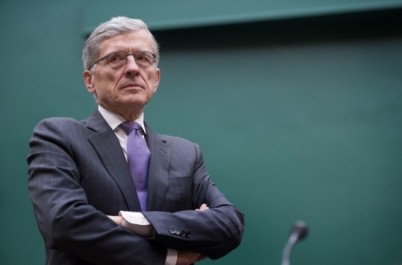
FCC Chairman Tom Wheeler has agreed to appear before the House Oversight and Government Reform Committee today to testify on the commission’s imposition of Title II regulation on the internet. He as also agreed to testify before the Senate.
Wheeler had stonewalled Congress for weeks, refusing to testify, while ramming through a 300-plus-page set of rules giving the FCC control over the internet, based on a Depression-era law regulating telephone service. The FCC essentially declared authority over the entire operation of the Internet in direct contravention to 1990s laws that created a hands-off approach that led to explosive growth in electronic communications and huge economic gains.
The congressional hearings will likely focus much attention on just how much influence the White House had on the rules, as Wheeler had moved relatively cautiously until President Obama began making much louder noises about the internet late last year. Congress would also do well to consider the influence of certain powerful search-engine companies that apparently wrote parts of the FCC’s rules.
Downton Abbey creator Julian Fellowes and executive producer Gareth Neame spoke at the INTV panel in Jerusalem yesterday, and Deadline Hollywood presents an excellent report on what they said and whether NBC’s announcement that Fellowes will do create a historical series called The Gilded Age for the peacock network means that Downton Abbey will end soon. (Answer: it doesn’t. Fellowes will do some work on The Gilded Age before Downton Abbey ends but won’t begin the NBC show until the British series has run its course.)
The most interesting observation in the Deadline Hollywood report is that Fellowes never took Downton Abbey to the BBC for consideration, deliberately choosing the commercial network ITV:
“The BBC are more interventionist. We wouldn’t have been able to make the show as we wanted to make it, whereas ITV is much more open. It has a much stronger philosophy about who to take on to make the show and having made the decision they let you get on with making it.”
As a government entity free from commercial considerations, the BBC is able to ignore the concerns of both audiences and producers. As Fellowes’ decision shows, competition provides the best results for both producers and consumers. If only Fellowes were running the FCC….
The three new Sunday night network TV shows are struggling to get and hold live+same-day viewers but are doing somewhat better at drawing digital audiences, although CBS’s Battle Creek is not doing very well with either. (Quality matters.) Deadline Hollywood summarizes it as follows:
Both Last Man and Secrets & Lies are solid DVR gainers so it’s hard to judge their performances by Live+same day numbers. The premiere of Last Man jumped to a 3.8 in the demo in Live+7 to become the second highest rated comedy debut this season behind ABC’s Black-ish. When Live+3 viewing is factored in, the second episode of Last Man cut its drop from the premiere from -25% to -9%. The comedy, whose premiere also nabbed 1.3 million streams in the first three days, appears to be very well suited to digital distribution but it will be a good case study to see if edgy, serialized comedies can survive on broadcast TV. Secrets & Lies’ Live+3 delivery also has been steady (2.1, 2.0 for the first two airings), while Battle Creek could not close the Week 1-Week 2 gap with time-shifted viewing (1.6, 1.2 in L+3).
The Fox comedy The Last Man on Earth seems to me to have the most appeal for younger audience members, and that is being borne out in its success in digital distribution. As Deadline Hollywood notes in regard to Last Man, the differing fortunes of these three shows will provide useful information about the effects of television’s changing audience demographics and distribution media.
To wit, CBS’s huge success with older viewers makes it the king of conventional TV, but whether that will translate to the changing digital marketplace is an open question. The answer will determine what sorts of programs will prevail as technological change kills off the current TV distribution system and replaces it with a less-structured, internet-based market.


http://www.allmovie.com/movie/barney-miller-the-election-v297218
For the first time in my life I am proud to say: “This is the police! Open the Report on Chain Broadcasting and begin reading!”
That’s pretty authoritarian, Bradley. So like the current FCC.
I think everyone should have a favorite FCC document. Including you, Karnick.
http://www.worldcat.org/title/supplemental-report-on-chain-broadcasting-october-11-1941/oclc/886646590&referer=brief_results
My favorite FCC document is “Report on Chain Broadcasting,” 1941.
Haha, no, they’re all basically awful.
Do you have a favorite FCC document?
No. However, my characterization of the FCC rulemaking is accurate. This is not a matter about which there is any doubt, and even pro-net neutrality advocates are appalled by Wheeler’s ppwer grab.
Wheeler had stonewalled Congress for weeks, refusing to testify, while ramming through a 300-plus-page set of rules giving the FCC control over the internet, based on a Depression-era law regulating telephone service. The FCC essentially declared authority over the entire operation of the Internet in direct contravention to 1990s laws that created a hands-off approach that led to explosive growth in electronic communications and huge economic gains.
—Have you read all 300 pages yet?